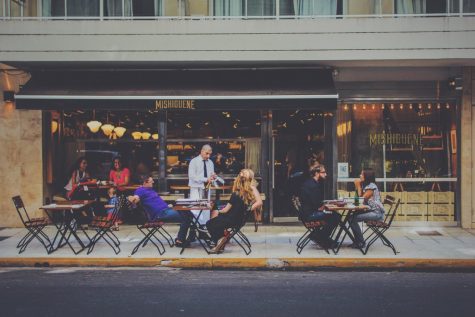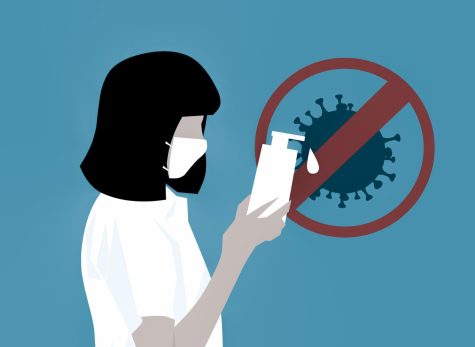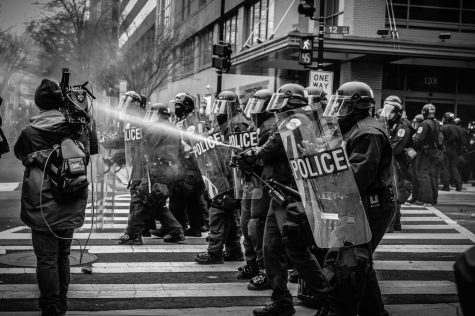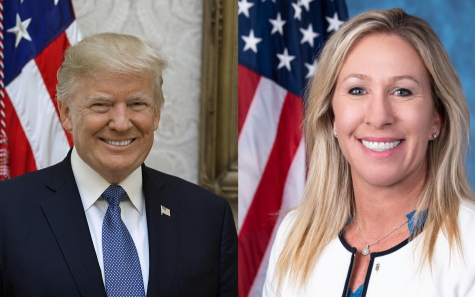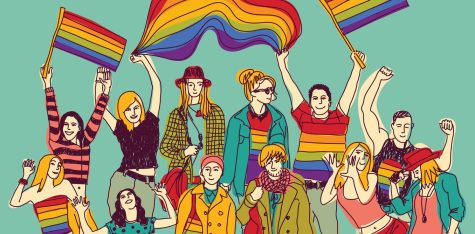BEYOND | Beyond the Office
In Beyond the Pandemic 2021, remote work became a central fixture for many workers. It has changed the way we live and work and presented new challenges in adapting ourselves to a new world. For some it was a blessing, for others a real challenge. In this article, I’ve interviewed three very different perspectives on how the pandemic has changed their lives.
Personal Challenges in Transitioning to Remote Work. – Lorraine Mafusire
 Lorraine is a Human Resources Hiring Manager for Outsource CFO, a company that specializes in recruiting and outsourcing talented, high-level Chief Financial Officers for small to medium sized enterprises. She interviews candidates to find the right fit for their entrepreneur clients, and it goes without saying that her work has a major social component.
Lorraine is a Human Resources Hiring Manager for Outsource CFO, a company that specializes in recruiting and outsourcing talented, high-level Chief Financial Officers for small to medium sized enterprises. She interviews candidates to find the right fit for their entrepreneur clients, and it goes without saying that her work has a major social component.
What was life like before the pandemic?
Oh gosh. Wake up at 4:30 a.m., get ready, get to work. I used public transport to get to Cape Town, and spent between an hour and a half, two hours in traffic each way every day. At 9 a.m., we would have our team meeting in the boardroom. Then work and have interview meetings to find competent people. Within about five minutes I could tell if a candidate was a good fit or not; if this meeting was going to be fun or horrible.
How did things change for you once lockdowns came into effect?
I didn’t even know Zoom existed until Corona became a thing! Then I had to worry about lighting and background. All these things matter apparently! I quickly had to learn about remote tech, I needed to get a desk at home, get lighting equipment and a good internet connection. Thankfully our company was experimenting with remote work so we were sort of equipped for this transition. A proper chair became a very, very important fixture because now I’m sitting all day.
Since you normally interview people in person, was this different for you?
It was different. You can pick up a few things about people but it’s not the same as meeting in person. It is a lot harder to do a proper “vibe check.”
How about meeting with your colleagues and doing work in general?
I struggled, I think most extroverts struggled, because I used to be able to just quickly go over to the director’s office for whatever reason I needed to. Now we have to schedule a meeting first. We had to figure out small things like, “should this be a meeting, or just an email?”. And meeting over video is different; we had to find ways to get people excited about video meetings. Then we had to have that meeting about showing up professionally to our morning team meetings. Some would just wake up and get on, still in their pajamas. We had to remind people to still dress like they used to, put in the hair gel and make-up like they used to. But I’m on team pajama bottoms! I’m willing to bet that pajama sales went way up during the pandemic… I also had to learn to separate work and home life now that it’s all happening in the same space. I had a lot more time on my hands but because my work is here at home, I would sometimes only get off at 10 p.m.; there was always that one more thing I could do. I had to quickly develop a routine and realize “switch off all devices, stay away from work after work”.
It is clear you are very extroverted. Was it difficult for you from a social and mental health perspective to adapt?
There has been a detachment in terms of colleagues. We used to have coffee every day, we used to have lunch together. We were friends of a sort, you know. But now it became apparent you are just colleagues, and you missed a lot of what was going on in each other’s personal lives. Our social connectedness took a marked drop – staying in touch with each other’s personal lives became very difficult. We tried online social meetings but people just weren’t into it. It felt like more work. I think a lot of people were tested in different areas. Personally, I hadn’t noticed that I was sliding back mentally. I always thought if you get depressed you would just instantly know it. It wasn’t until a good friend pointed out that I wasn’t my usual self. In my culture, mental health is not something that is really talked about so I had a lot of learning to do on the subject. I had to force myself to do certain things; just because I did not feel like it does not mean I did not need it. So I made a point of it to keep my room and place tidy, to get out for a walk or jog, and to stay connected to friends. I wish I had this perfect formula where I can say, “This is how you move from point A to point B”, but I don’t. I just tried different things.
In terms of benefits, what did you like about remote work?
Instead of having to get up at 4:30 a.m., I could now get up at 7 a.m. to start my day at 8 a.m.. The beauty of it! I saved a lot of money and time not having to commute every day. There were all these little expenses I never really noticed before, like the impromptu coffees and lunches with colleagues.
If you could flip a switch to go back or have things stay the way they are, what would you do?
If you had asked me last year, about a year after COVID-19 and lockdowns, I would’ve loved to go back to the way things were. But the answer has since changed. Human beings adapt. I am loving this now. I cannot imagine going back to the office.
Common Sense Left as Restrictions Entered – Andre Niewoudt.
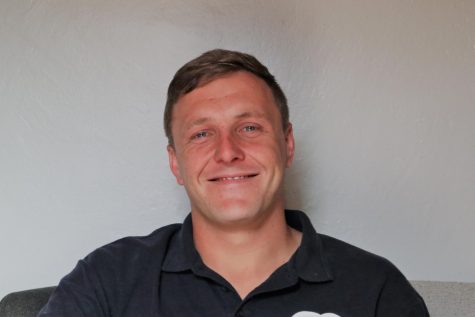 Andre worked as a Communications Technician during the 2020 pandemic. His firm had a government contract to provide Internet access to schools in some of the most remote areas of South Africa. His job entails climbing up massive communication towers, repairing and installing dishes, setting up network links, configuring protocols – in short, he keeps the Internet running and people connected.
Andre worked as a Communications Technician during the 2020 pandemic. His firm had a government contract to provide Internet access to schools in some of the most remote areas of South Africa. His job entails climbing up massive communication towers, repairing and installing dishes, setting up network links, configuring protocols – in short, he keeps the Internet running and people connected.
What was life like before the pandemic?
In the early stages of the COVID-19 news, about two months before there was any talk of lockdowns, our firm got this contract, and I headed out to the Northern Cape province to execute the job. I was all by myself, and I lived alone in a small house in the middle of nowhere. The closest town was about 150 miles from me. I was right next to the Vaal River, so I spent a lot of time fishing and hunting out there.
How did things change around there once lockdowns rolled around?
It was very weird in the beginning. Nobody really knew what to make of the whole thing. It was so strange to see people rush and buy mountains of toilet paper, of all things. The little town closest to me was very rural and relaxed. Nobody reacted with a PANDEMIC! panic, but you still had to wear masks inside stores. It did shut down any chance of social interaction because government regulations had shut down all social gathering places so it got a little lonely but I enjoyed my time out in nature. There was this little permanent roadblock outside the town. Every time the same people pulled me over, looking at the same paper, asking me the same question: Where did I get this permit from? Every time. (Some background: The South African Government had instituted an 8 p.m. curfew with the lockdown. Citizens could be arrested if they were out after this time, unless they had a permit for work or emergency purposes.)
Your job is one of those that cannot be done remotely. Did anything change in the way you worked?
The work was still the same. The towers I worked on w[ere] very remote, far from any real civilization. I had to create these connections that hop connectivity across the deserted landscape to give the children out there Internet access. But still, every morning I had to fill in a form and check my temperature. Imagine that, all alone out there, with no one else around. My contract to work out there was set for a certain value and time. During the pandemic, the company got a new manager that insisted on rewriting our contracts, limiting our time and work. All of a sudden, I was getting paid about a third of what I was supposed to.
That’s rough. Did you manage to re-negotiate, or come to an amiable agreement?
No, I ended up making a loss going out there. I think COVID was used as an excuse to undercut us anyway. They suddenly wanted to keep track of every minute “on the job,” but my office was at that house I lived in, and I must travel hundreds of miles to get between sites. After a week of waiting on them and receiving no response about getting my fair compensation, I hired a one-way trailer from the nearest town, packed my things and went back home. They were pretty sorry after that. There is not a lot of people that can do what I do solo.
I’m sorry to hear that. What did you do once you got back?
I took a temporary job at a fabrication facility. There was not a lot of businesses open but anything was better than nothing. Here it made more sense to keep track of health signs, and we wore masks every day. After things cooled down, I took a job doing security installations. I am still with this company today and I’m happy with the work we do.
Remote Work Opens Up New Possibilities. – Ryan Wilson
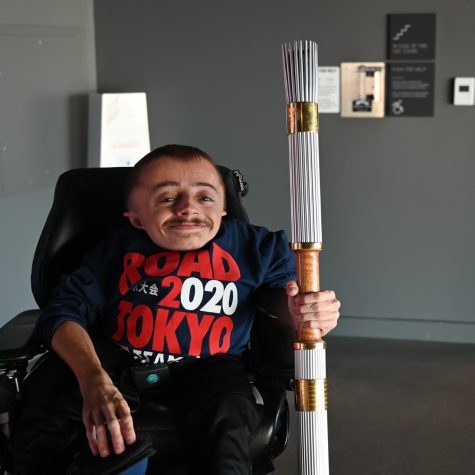 Ryan is an entrepreneur that started a business during the pandemic. Kicking off in February 2021, his company, Team Trust Productions, produces film and media content with a focus on storytelling that benefits the disability community. They partner with nonprofits and businesses alike to showcase positive contributions to the disability community. Ryan is also a 2015 graduate of Lincoln Land and a former editor of The Lamp.
Ryan is an entrepreneur that started a business during the pandemic. Kicking off in February 2021, his company, Team Trust Productions, produces film and media content with a focus on storytelling that benefits the disability community. They partner with nonprofits and businesses alike to showcase positive contributions to the disability community. Ryan is also a 2015 graduate of Lincoln Land and a former editor of The Lamp.
Did the pandemic affect you personally?
I’m not sure how much you know about me, but I have a disability. I had student assistants to help me get through my day-to-day. Once we had a lockdown, they had to go home because schools shut down and everything went remote. This was initially a challenge but I try to convert any perceived obstacle into an opportunity. I made the decision to go about my days independently. It seemed to work out.
It is inspiring that you kept going and found opportunity for business regardless. Has your business been affected in any negative way?
For Team Trust in particular, we haven’t been limited too much. All our videographers take great precautions to be safe. I lean toward being extra-cautious. In the disability community, existing conditions could complicate and worsen the effects if someone got COVID. But it has unquestionably slowed down our productions.
Have remote technologies played any role in your business model?
If it wasn’t for the pandemic I wouldn’t be as well versed with Zoom and Skype and those things as I am now. But we have been utilizing remote technology and we would’ve been using it regardless of the pandemic. Often, we meet with board members and executives who are all over the country. It is a lot easier than having to fly out and meet them. Remote technologies actually open up the job market, giving more people access to employment than it did before – for example the disabled community, who have a high unemployment rate historically.
What is next for you and Team Trust Productions?
Right now, we’re following a nonprofit on a nine-city tour across the South-Eastern United States that promotes adaptive mountain biking for the disabled community. It has been a really fun adventure for us to film this sport. We’ve got some other projects in the works too, some of them focusing on research opportunities that has come up thanks to COVID-19.
Are you anxious for the world to return to normal?
Yes! I can’t wait to go into the store and shop in peace without the fear or worry of catching something that could be potentially life-altering. I’m always wearing a mask on productions and would be happy to do away with that too.
Chris Koorzen is a journalism student from South Africa. He is an advocate for unrestricted free speech and deeply interested in people’s life experiences. He resides outside Cape Town in Somerset West, where the majestic mountains meet the Atlantic and Indian Oceans.




